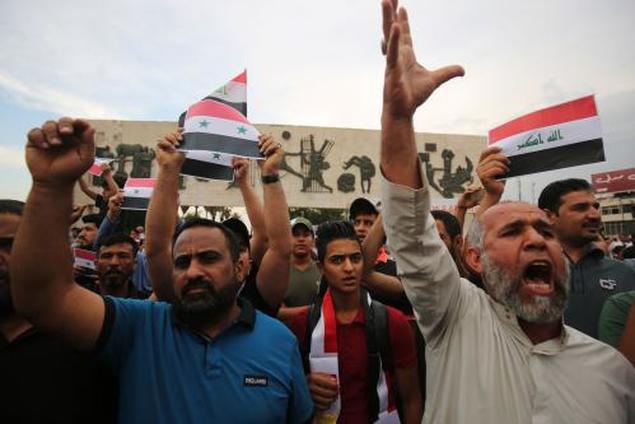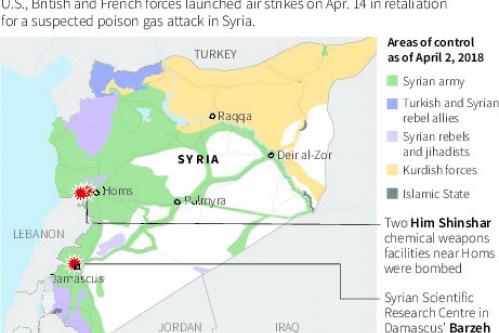Iraqi Foreign Minister Ibrahim al-Jaafari spoke on the phone Sunday with acting U.S. Secretary of State John Sullivan, discussing the trilateral U.S., French and U.K. missile attack on Syria, which Iraq considers an ally in the fight against the Islamic State militant group (ISIS). Jaafari emphasized "the necessity to prioritize finding a political solution and that the Syrian people alone should determine their own fate," according to a statement by the Iraqi Foreign Ministry.
Jaafari condemned the production and use of chemical weapons, but warned that "any escalation in Syria will negatively affect the security and stability of the region as a whole, and will give terrorism an opportunity to regain its activity after the defeat it met in Iraq and its retreat in Syria. The risk of terrorism today threatens all countries of the world."
Washington and Baghdad became allies after the U.S. invaded in 2003and overthrew the government of Iraqi President Saddam Hussein, charging him with producing chemical and other weapons of mass destruction. Those accusations later turned out to be false, but the U.S. installed a friendly, majority-Shiite Muslim government as it faced an increasingly deadly insurgency from Sunni Muslim groups, including Al-Qaeda in Iraq, which later merged into the Islamic State of Iraq.
While jihadi remnants still exist and remained capable of launching attacks, Syria declared victory against ISIS in November, and Iraq declared its own war had been won the following month. Calls for the U.S. and Turkey—which has escalated its own war against Kurdish militias in Iraq and Syria—to withdraw their armed forces have since increased, and both the Iraqi and Syrian governments' close relations with Iran, an avowed foe of U.S. foreign policy, have complicated regional dynamics.
The U.S.-led strikes on Syria Friday came after a number of Western governments and their allies accused Syrian President Bashar al-Assad of using toxic gas on the rebel-held Douma district near Damascus the previous Saturday. Trump had warned that he would respond "forcefully" to the reports; after the dust settled, Iraq was one of the few Middle Eastern countries to condemn the attack. Lebanon also condemned the attack, which used its airspace without permission.
Iraq's statements placed it in the camp of Russia and Iran, Assad's top allies in his seven-year war against rebels and jihadis, and the U.S.'s top competitors for influence across the Middle East. Russia had warned it would attack not only U.S. missiles but also their delivery vehicles in the event that Russian personnel were at risk. The targets, however, appeared to be limited to three state-run Syrian scientific centers in Damascus and Homs. Neither the U.S., Russia nor Syria reported any fatalities; however, the official Syrian Arab News Agency said three civilians were injured when air defenses forced a missile to go astray in Homs.
The Syrian government only recognizes Russia and Iran's military presence in the country and has called on the U.S. and Turkey to withdraw. Damascus, Moscow and Tehran have all accused the U.S. of supporting ISIS and other jihadi groups as a means of disturbing the regional order, something successive administrations in Washington have denied. Trump expressed an interest in expediting the departure of U.S. troops up until the alleged chemical attack in Douma, where Islamist Jaysh al-Islam insurgents recently surrendered and have begun to evacuate.
Source: www.newsweek.com/us-ally-iraq-joins-russia-and-iran-says-trumps-syria-strikes-may-help-isis-887829?amp=1



 RSS Feed
RSS Feed